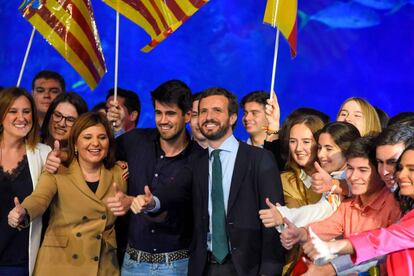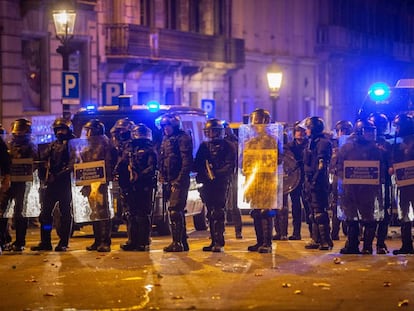Vox and Catalonia dominate the end of the election campaign in Spain
Issues like the economic slowdown have been dropped as candidates vie for undecided voters ahead of the vote on November 10


As Spanish politicians enter the home stretch of the election campaign, candidates have dropped topics like the economy or technology, and are instead focusing on Catalonia and Vox, the far-right party that is soaring in voting intention.
The right-of-center Popular Party (PP) and Ciudadanos (Citizens) on Thursday supported a proposal made by Vox in the Madrid regional assembly to “immediately outlaw” any separatist parties “that attack the unity of the nation.”
The initiative was merely symbolic, but it illustrated how the PP and Ciudadanos are scrambling to attract undecided voters by embracing far-right proposals in a way that would have been unthinkable until very recently.
Academics take a stand against Vox
More than 1,600 professors and researchers have signed a statement denouncing the "manipulation of figures" by Vox leader Santiago Abascal at the televised election debate on Monday night.
The document accuses Santiago Abascal of trying to establish false "cause-and-effect relationships between irregular immigration and urban crime, the foreign population and gang rape, the cost of regional management to the state" by misrepresenting statistics and the results of sociological reports.
"Covering up an ideological agenda of extreme nationalism based on intolerance, racism and xenophobia with supposedly objective data, not only discredits and distorts the work of thousands of social researchers, it hurts the foundations of social harmony," it adds.
Meanwhile the Socialist Party (PSOE), which has been heading a caretaker administration since the inconclusive election of April 28, has also taken a harder line on Catalan separatism during this campaign, but it does not seem to have had the desired effects. Surveys show that Pedro Sánchez’s party could even lose seats, although it is still expected to be the winner on Sunday with around 121 representatives in the 350-strong lower house. Government sources said they are hoping to attract last-minute “cautious” voters who feel the Socialists have the best chance of forming a majority.
What has really caught PSOE and PP leaders off guard is the fact that the economy, which proved decisive in earlier elections, has barely been mentioned at this week’s televised debates. On Thursday, top officials from Spain’s five main parties held a discussion on Spanish free-to-air television channel La Sexta that went much deeper into the issues than the candidates’ debate on Monday, but did not produce any solutions to the prolonged political stalemate in Spain, which is about to hold its fourth national election in four years.
Analysts have noted that at the Monday debate, neither Pedro Sánchez of the PSOE, Pablo Casado of the PP, Albert Rivera of Ciudadanos, or Pablo Iglesias of the anti-austerity Unidas Podemos made significant efforts to refute the often unfounded claims made by Santiago Abascal of Vox, who appears to have gained the most from his presence at the televised event.
This much seemed evident on Thursday, when Casado and Abascal both held rallies in the eastern region of Valencia. The president of the PP, one of the two parties that have traditionally dominated Spanish politics since the end of Franco’s dictatorship in the late 1970s, managed to attract around 1,200 people, according to event organizers. Abascal, whose party first entered the Spanish Congress in April of this year, drew over 6,000 followers. And surveys show that Vox could outperform the PP on Sunday in several provinces, particularly those along the Mediterranean.
What about the economy?
Although Catalonia and Vox have pushed other topics out of the public debate, several politicians consulted by this newspaper underscored that the economic slowdown is the number one issue that the next government will have to deal with.
Spain has soaring public, private and external debt levels, as well one of the EU’s highest deficits and the second-highest unemployment rate after Greece. Outside factors such as a hard Brexit, a fall in global trade due to protectionist policies, or a crisis in the auto sector would all be highly detrimental to the Spanish economy. Yet issues like the effects of globalization, the tech revolution or the impact of automation on jobs were nowhere to be seen throughout this campaign.
English version by Susana Urra.









































